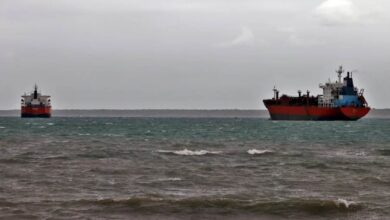What Is It and What Does It Mean that Russia Can Enter the List of Countries that Support Terrorism?
The United States is considering placing the Eurasian country alongside North Korea, Iran, Cuba, and Syria as one the countries that seek to create terror in the world, taking into account the invasion of Ukraine.

Destroyed Russian tanks litter the streets of Bucha, following the Russian withdrawal from Irpin and Bucha. Photo: ZUMA Press Wire Service/dpa
LatinAmerican Post | Christopher Ramírez Hernández
Listen to this article
Leer en español: ¿Qué es y qué significa que Rusia pueda entrar a la lista de países que apoyan el terrorismo?
The war that unleashed Russia's invasion of Ukraine has also brought with it various consequences of a diplomatic nature between the Kremlin (Russian government) and Western governments, with the United States as the protagonist. Before starting the war, the North American country had already established several economic sanctions against Russia, trying to prevent what finally happened on February 24: the entry of Russian military forces through eastern Ukraine.
Thus, after two months of new blockades and attempts to reduce the Kremlin's strength in Ukrainian territory, on April 19 a new idea was revealed that the United States has to continue diminishing the Russian spirit, and its importance in the world: including put Russia on the list of countries that support or sponsor terrorism.
"We are studying the facts. We are reviewing the law. If it is the responsibility of this body or another, if it is effective and appropriate," explained the spokesman for the Department of State of the North American country, Ned Price. It should be remembered that it is currently ready to make up countries with governments considered by the United States to be a totalitarian regime, with communist ideals that violate the human rights of their citizens: North Korea, the Islamic Republic of Iran, Cuba, and Syria.
Estados Unidos incluiría a Rusia en lista de países patrocinadores del terrorismo
—-
El listado norteamericano incluye en estos momentos a Corea del Norte, Irán, Cuba y Siriahttps://t.co/gZ3wcFPscq pic.twitter.com/a6AkoQcHON— Diario la Verdad (@La_VerdadSonora) April 19, 2022
What Does This Mean?
According to the United States Department of State, what happened with Russia in Ukraine, especially in situations that Joe Biden himself has labeled "genocide" in territories such as Bucha or Mariúpol, makes him worthy of a position on a list in that only countries that “have repeatedly given support to acts of international terrorism” are included.
"Russia, more than an invasion, more than starting a war, has launched a campaign of terror, a campaign of brutality, a campaign of unfortunate aggression against the people of Ukraine," Price stressed.
For its part, the UN, through the High Commissioner for Human Rights, Michelle Bachelet, said it was "horrified by the images of civilians lying dead in the streets and in makeshift graves in the city of Bucha in Ukraine," assuring, parallel to what the United States said, that Russia is committing "war crimes, serious violations of international humanitarian law and serious violations of international human rights law", although it never branded the country a terrorist.
We recommend you read: Vladimir Putin's Other Wars
What Implications Would this Decision Bring to Russia?
The fact that for the United States Russia is part of the list of "Countries sponsoring international terrorism" brings with it certain limitations, especially economic against the Kremlin, which in turn would significantly reduce its impact in the midst of war.
According to a State Department report, when a country is part of the US "black list", its government is not considered a terrorist only by the White House, but by a whole group of states and international organizations whose fight against terrorism unites them.
In this way, Russia would find itself up against an international bloc that would do everything possible to counteract its “terrorist” actions in Ukraine, which, of course, for the United States would mean ending the Russian invasion of that country.
“The vigilance of all members of the international community is essential to limit the mobility and capacity of terrorists around the world, and both we and the terrorists know it,” explains the Department of State.
Thus, in the event that Russia reaches this undesirable list, it would be facing "four basic principles of international politics" that the United States defines as:
First: cancel all international dealings with Russia and avoid at all costs making concessions to its government, considering it "terrorist".
Second: all possible means will be sought to "bring the terrorists to justice for their crimes." Can this be taken as an arrest threat against Vladimir Putin?
Third: "isolate and pressure states that sponsor terrorism to force them to change their behavior," the report adds. This, of course, means reinforcing existing sanctions and creating new blockades that practically drive Russians away from the Western world, both in social and investment terms and in terms of weapons.
Fourth: this last point could be, perhaps, the most important or "new" in the midst of the war in Ukraine, since it encourages a situation that the United States had avoided since the beginning of the conflict: helping Ukraine directly in the war.
Although it is not clear what are the strategies and benefits that the Ukrainian people could receive with the enlistment of Russia as a "terrorist country", the truth is that this incident opens the door that, as the State Department document explains, "strengthen the counterterrorism capabilities of those countries that work with the United States and require assistance."
Of course, this situation raises other fundamental questions: what would Russia's response be if it were included on the list of countries that support terrorism? Could this be the excuse that the United States was looking for to enter the war directly? Will other organizations such as the European Union or NATO (commanded by the United States) follow in the footsteps of the North American country?
The only certainty is that this decision would only increase the social crisis that has been looming for more than two months throughout the world due to the war, and which, according to a report by the UN World Food Program (WFP), has increased the threat of famine across the globe.
The PMA assures that the war in Eastern Europe represents an increase of more than 71 million dollars per month in its operating costs. "We have to cut rations for refugees and vulnerable populations in East Africa and the Middle East (…) Halved rations mean that hungry children eat the equivalent of a bowl of cereal a day," concluded the executive director of this entity, David Beasley.





